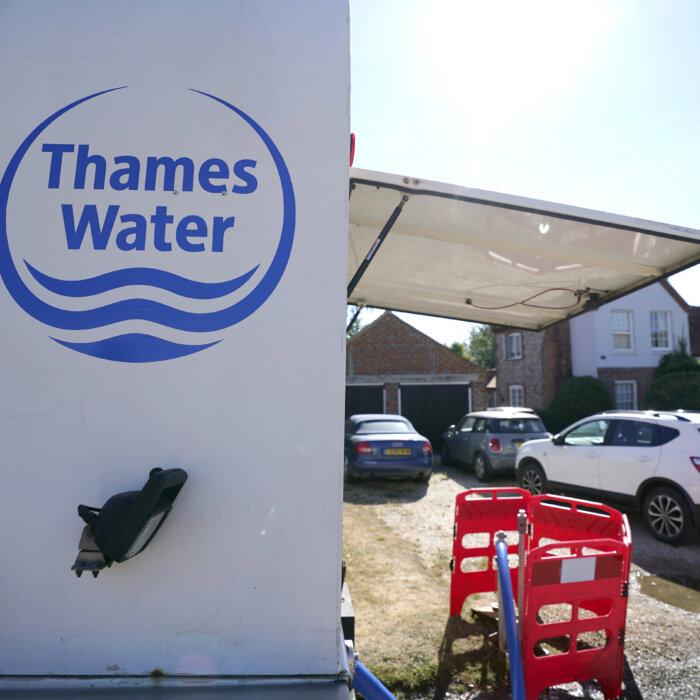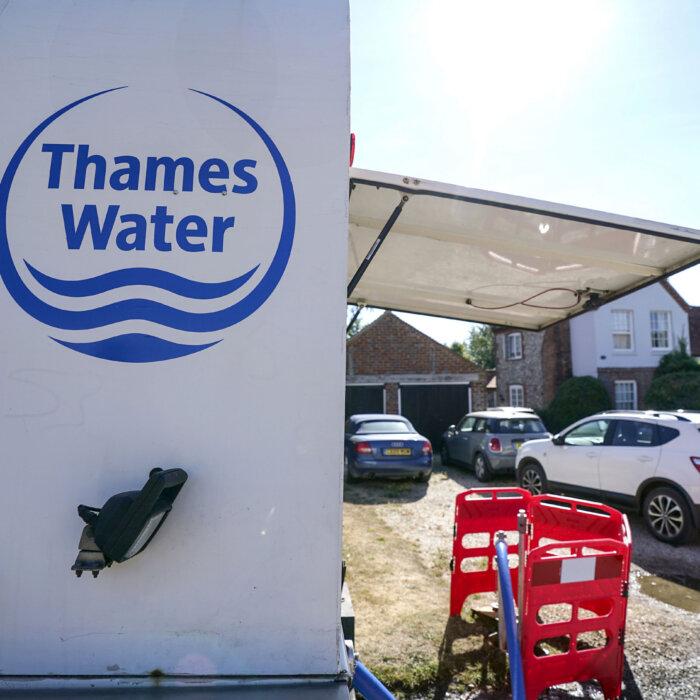Plans to restructure Thames Water through a loan of up to £3 billion have been approved by a High Court judge, allowing the struggling utility to stay afloat just weeks before it was set to run out of money.
Thames Water Utilities Holdings Limited (TWUH), the parent company of Thames Water Group, England’s biggest water company with about 16 million customers, is in around £16 billion of debt and needs £3.3 billion over the next five years to keep running.
Earlier this month, Mr. Justice Leech heard several days of arguments over whether to approve a restructuring plan, known as the “company plan,” which provides a loan of up to £3 billion with a 9.75 percent interest rate.
TWUH’s lawyers claimed the company would enter special administration (SAR) if the plan was not approved, but a smaller group of secondary creditors proposed an alternative plan known as the “B plan,” which the court heard would provide the company with the same funding but on better terms and should be adopted instead.
In a judgment on Tuesday, Mr. Justice Leech ruled that the “relevant alternative” to the company plan being approved was SAR, and said: “After taking into account the public interest in ensuring the uninterrupted provision of vital public services, I nevertheless exercise my discretion to sanction the plan.”
A hearing before the same judge, dealing with consequential matters arising from the judgment, is set to begin later on Tuesday.
A hearing to consider whether the “B plan” can be put to creditors for approval could also be held on Wednesday.
Following the ruling, Thames Water Chief Executive Chris Weston said: “We are pleased the court sanctioned the company plan.
“This is good news for our customers, puts our business on a firmer financial footing, and enables us to continue to invest in our network and deliver critical infrastructure upgrades for our customers and the environment.
“Importantly, this decision will support the delivery of our turnaround which is underway.”
The High Court heard earlier in February that the restructuring was intended to be an interim measure to keep the company running before a substantive restructuring due later this year.
TWUH provides services through a direct subsidiary, Thames Water Utilities Limited (TWUL), which serves about 16 million customers—about 25 percent of the UK’s population—and owns more than 20,000 miles of water mains and more than 68,000 miles of sewers across London, the Thames Valley, and the Home Counties.
Tom Smith, KC, for TWUH, told the court that letting it run out of money by not approving the company plan was “a risk which cannot be run.”
The company plan, drawn up by a cluster of investment giants including BlackRock, Abrdn, and M&G, would effectively guarantee Thames Water can keep operating until 2026 by providing £1.5 billion of funding, with a further £1.5 billion potentially available.
It would also see payment dates for its debts extended by two years.
The court was told it had been approved by creditors holding more than 75 percent of its Class A debt, which is worth about £11.5 billion and is the least risky class of bonds in its debt pile.
The utility’s Class B bondholders drew up their rival “B plan” in October, saying this would provide “committed” funding of £3 billion with a lower interest rate of 8 percent, and other different terms.
Their barristers told the court that the company’s proposal leaves them worse off and “does not seek to solve the financial difficulties” of the company, meaning it could not be approved.
Charlie Maynard, Liberal Democrat MP for Witney in Oxfordshire, also opposed the plans in court, claiming the utility should be put into administration because the company plan is “a short-term fix at the expense of the company, Thames Water customers and UK taxpayers.”
In his 178-page ruling, Mr. Justice Leech said that “well over 50% of the scheduled loans go round in a circle and back into the pockets of the plan creditors,” and also said the costs of finance and adviser fees in the case are “eye-watering.”
He said: “TWUL is a public utility funded by the water bills of the residents and commuters of London and the South East who cannot do without the water supply.
“Customers and residents who are struggling with their bills will be horrified at these costs and mystified how the Thames Water Group has been able to fund them or why it has agreed to do so.”
He continued: “If it had been clear that TWUL would have had to bear all of these costs totalling £800 million as the price of extending the liquidity runway until the equity raise could be completed, I might have been tempted to refuse to sanction the plan on the basis that the costs were simply too high and that the plan company should present a new plan on much better terms.”
But the judge said he was persuaded to approve the plan because he was “not satisfied that TWUL or its customers will have to bear the finance costs of the plan whether in the short term or the long term.”
He also said he “ought to give the plan company an opportunity to finish the jigsaw” through the substantive restructuring.
He said: “There is a public policy in favour of rescuing the Thames Water Group and giving the market a chance to agree a permanent restructuring plan before the Government is forced to fund a special administrator.”
He also added that Ofwat and the environment secretary “have not opposed the plan.”






